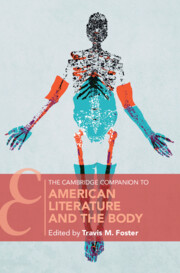Book contents
- The Cambridge Companion to American Literature and the Body
- The Cambridge Companion to American Literature and the Body
- Copyright page
- Contents
- Contributors
- Chronology of Publications and Events
- Acknowledgments
- Introduction
- Part I Genres
- 1 Bodies in Early US-Atlantic Theater
- 2 Sentimentalism and the Feeling Body
- 3 Slavery, Disability, and the Black Body/White Body Complex in the American Slave Narrative
- 4 Monstrous Bodies of the American Gothic
- 5 Bodies at War
- 6 Decolonizing the Body in Multiethnic American Fiction
- 7 Science Fiction’s Humanoid Bodies of the Future
- 8 Contemporary North American Transgender Literature
- Part II Critical Methodologies
- Further Reading
- Index
- Cambridge Companions To …
8 - Contemporary North American Transgender Literature
Realness, Fantasy, and the Body
from Part I - Genres
Published online by Cambridge University Press: 30 July 2022
- The Cambridge Companion to American Literature and the Body
- The Cambridge Companion to American Literature and the Body
- Copyright page
- Contents
- Contributors
- Chronology of Publications and Events
- Acknowledgments
- Introduction
- Part I Genres
- 1 Bodies in Early US-Atlantic Theater
- 2 Sentimentalism and the Feeling Body
- 3 Slavery, Disability, and the Black Body/White Body Complex in the American Slave Narrative
- 4 Monstrous Bodies of the American Gothic
- 5 Bodies at War
- 6 Decolonizing the Body in Multiethnic American Fiction
- 7 Science Fiction’s Humanoid Bodies of the Future
- 8 Contemporary North American Transgender Literature
- Part II Critical Methodologies
- Further Reading
- Index
- Cambridge Companions To …
Summary
On December 19, 2019, J. K. Rowling, the British author of the popular Harry Potter series, tweeted her support of the view that it is impossible to change one’s sex. “Sex is real,” she claimed, and, by extension, immutable. Rowling was not writing in a vacuum. The notion of biological sex, its fixity and binary structure, is called upon time and again, often to dismiss claims for transgender rights. Faced with this context, a prominent response to Rowling’s tweet deserves attention. Both The Washington Post and The New York Times published essays by transgender writer-activists who explained how disappointed they were by Rowling’s position, especially given their attachment to her books.
- Type
- Chapter
- Information
- The Cambridge Companion to American Literature and the Body , pp. 117 - 132Publisher: Cambridge University PressPrint publication year: 2022
- 1
- Cited by

